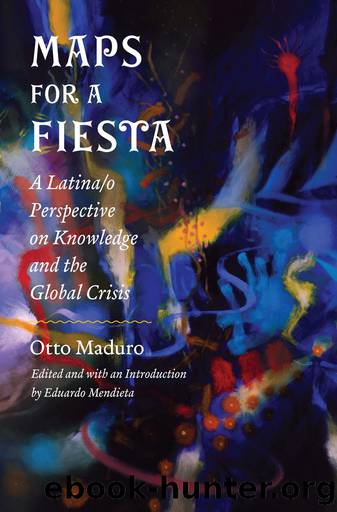Maps for a Fiesta by Maduro Otto;Mendieta Eduardo;Mendieta Eduardo;

Author:Maduro, Otto;Mendieta, Eduardo;Mendieta, Eduardo; [Maduro, Otto]
Language: eng
Format: epub
Publisher: Fordham University Press
Published: 2015-08-15T00:00:00+00:00
5. Rethinking Our Understanding of Knowledge
In the 1980s, when Ronald Reagan was president of the United States, a minor scandal stirred up the press and political world: serious economic, political, and military decisions of the most powerful government on the planet were made by Reagan after consultation with close friend of the First Lady and astrologist Jeane Dixon. Friends and advisers of the president both confirmed and denied the reports, some refused to comment, and others simply affirmed that confusion reigned in the White House. Dixon herself saw her book sales and contracts increase, while newspapers and magazines the world round filed reports on similar occurrences in many current and past governments.
More than thirty years ago, I read a Life magazine article on Haiti. The reporter related his visit with a working woman in the capital, Port-au-Prince. At a certain moment in the interview, the woman excused herself for a few minutes, went out to the patio, and stood with her hands on the trunk of a tree. Upon returning, the reporter asked her what was going on. The woman replied that her husband had gone to the market on errands, and she had forgotten to ask him to pick up a few things. So she went to the tree, she explained as a matter of fact, because they did not have a telephone.
Naturally, the journalist extended the interview until the womanâs husband returnedâwith the very things his wife had mentioned.
⢠⢠â¢
Whenever the subject of human knowledge comes up, many questions arise, such as, canât we be certain about anything? What if scientific knowledge isnât verifiable, irrefutable, and in constant progress? Where does truth reside? Is everything really relative, equal, and right? And what about error and lies? Whatâs the relation between scientific knowledge and other forms of knowledge?
In this final chapter on human knowledge and its relation to the transformation of unjust social conditions, I am going to quickly touch upon some crucial questions.
Before proceeding, I want to reiterate that I neither claim to nor want to exhaust this subject in all of its possible facets. What I do aim to do is touch upon some the most serious and urgent aspects of the problem of knowledge in the Americas today.
I would also like to make it equally clear that I donât have the last word on the subject. I would merely like to propose some provocative ideas to stimulate questioning, open-mindedness, pluralism, curiosity, research, critical reflection, discussion, and creative imagination. In fact, I am convinced that there is a shortage of these very things. But there is an abundance of unreflective certainties, close-mindedness, dogmatism, fear of venturing into unknown territory, passivity, conformity, and the incapacity to discuss these things in a serious, intense, and extensive way. Especially in these years of crisis, paralyzing doubts, self-destructive uncertainties, confusion, chaos, resignation, indecision, and fear abound.
Having said this, we are going to examine a set of problems that seem too important to leave out of the reflections shared here. Some were raised in earlier chapters but will be more fully developed here.
Download
This site does not store any files on its server. We only index and link to content provided by other sites. Please contact the content providers to delete copyright contents if any and email us, we'll remove relevant links or contents immediately.
Fangirl by Rainbow Rowell(9259)
How to Bang a Billionaire by Alexis Hall(8160)
Wonder by R. J. Palacio(8115)
The Thirst by Nesbo Jo(6946)
The Space Between by Michelle L. Teichman(6943)
Assassin’s Fate by Robin Hobb(6225)
Wiseguy by Nicholas Pileggi(5791)
The Night Circus by Erin Morgenstern(5227)
Paper Towns by Green John(5194)
The Kite Runner by Khaled Hosseini(5183)
Bittersweet (True North #1) by Sarina Bowen(4848)
Gerald's Game by Stephen King(4656)
Too Much and Not the Mood by Durga Chew-Bose(4349)
Pillow Thoughts by Courtney Peppernell(4286)
Goodbye Paradise(3812)
Twelve Days of Christmas by Debbie Macomber(3573)
Good by S. Walden(3561)
The Rosie Effect by Graeme Simsion(3471)
The Cellar by Natasha Preston(3347)
